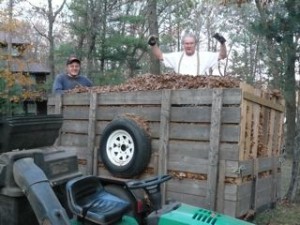Having learned many lesson from my own gardening and outdoor work, I found this to be a tremendous article with wise tips.
Joanne Quinn-Smith, 2009 Small Business Administration Journalist of the Year
Host of the Monday Morning Marketeer
Never Rake Leaves Uphill and Other Management Lessons Learned in the Northwoods
November 4, 2010 by Art Petty
Filed under: Career, Leadership, Management Education, Performance, Project Management, Social Satire
Filed under: Career, Leadership, Management Education, Performance, Project Management, Social Satire
 Note from Art: some lighter thoughts connecting the world of good old-fashioned (and cathartic) physical labor to the world of projects and work. And some bonus advice for getting along, especially with your spouse or significant other!
Note from Art: some lighter thoughts connecting the world of good old-fashioned (and cathartic) physical labor to the world of projects and work. And some bonus advice for getting along, especially with your spouse or significant other!Spend enough time writing, speaking and thinking about management and performance, and you’re likely to find yourself looking for lessons in all of your dealings. This certainly held true for me this past weekend, as I engaged in the annual fall ritual of cleaning up the leaves at the northwoods home.
While the management guidance here might not make the next issue of HBR, if you ever face several hilly acres of ankle deep leaves, this might just save your back from breaking and your relationships from crumbling!
1. First and foremost, never rake leaves uphill. Ditto for against the wind! Gravity and other forces of nature are your friends here. Don’t fight them. Leaves tend to fall downhill, blow downhill and generally migrate towards their friends at low points in the land.
Adding a little science (very little!), you might reasonably conclude that the energy consumed per unit of leaf raked is pretty high when you push the little buggers up hill one at a time. Your goal here is minimal energy consumption on this task. Remember, after the leaves are gone, you’ve probably got to split a cord of wood.
In the Workplace: Too many projects feel a lot like raking leaves uphill. Poor project design and improper training result in a lot of commotion and little forward progress. And small obstacles easily become gigantic bottlenecks that soak up valuable management time and impact schedules and performance. If you feel like you are “raking uphill and against the wind,” stop, assess and address the challenge from a new perspective.
On a personal note, it is your wife that is raking uphill, use your best tact and diplomacy to encourage her to rethink her approach. Trust me, I learned this one the hard way.
2. Proper planning and flawless execution are required to effectively land a tarpaulin so that you can cover it in leaves on a windy day.
In the Workplace: anyone that has ever been involved in a complex project with multiple coworkers, understands the benefits of great teamwork and great team members operating in synchronicity towards a common goal. It’s easy to misfire and quickly become aggravated with poor performing or poorly trained team members, and then it’s only a short step away from complete team meltdown. Take the time to clarify tasks, practice the execution and then provide team members with effective, real-time feedback.
Another personal note: if it’s your wife or spouse that is misfiring on the tarp job, use your best tact and diplomacy to teach and encourage improved performance. Trust me, again!
3. Know your own limit of incompetence when it comes to team safety. Don’t ever plan on flying an airplane if you cannot consistently remember to raise the wheel on the brush trailer before heading up your driveway digging a new ditch and wrecking yet another wheel.
In the Workplace: risk management is a critical issue to be managed in real-time. Teach your team and yourself to constantly assess risks and build systems to identify and mitigate or eliminate those risks. Also, learn your limits. Some people and some teams just shouldn’t fly airplanes or run nuclear power plants.
4. Choose the right leader for the job at hand, and shift leaders as the jobs change. Put two corporate executives used to leading teams on the same task to conquer the clean-up, and you might not find it shocking that both individuals have a very strong opinion on how things should be handled. My Dad and I learned long ago to swap roles. For example, I’m a master laborer and he’s a master engineer. If the task calls for bulk, brawn and speed, I’m in charge. If it’s the redesign of the in-ground sprinkling system or rewiring of 2 acres of ground lights, it’s all Dad!
In the Workplace: learn to lead and to follow and learn to make the transition gracefully and your project and execution performance will improve tremendously.
The Bottom-Line for Now:
May all of your fall projects be as filled with management and relationship lessons as mine!

No comments:
Post a Comment